‘Always making demented performances’: Meet the professional clown with a show about the Holocaust
Alexandra Tatarsky enters the hellscape of the Jewish mind
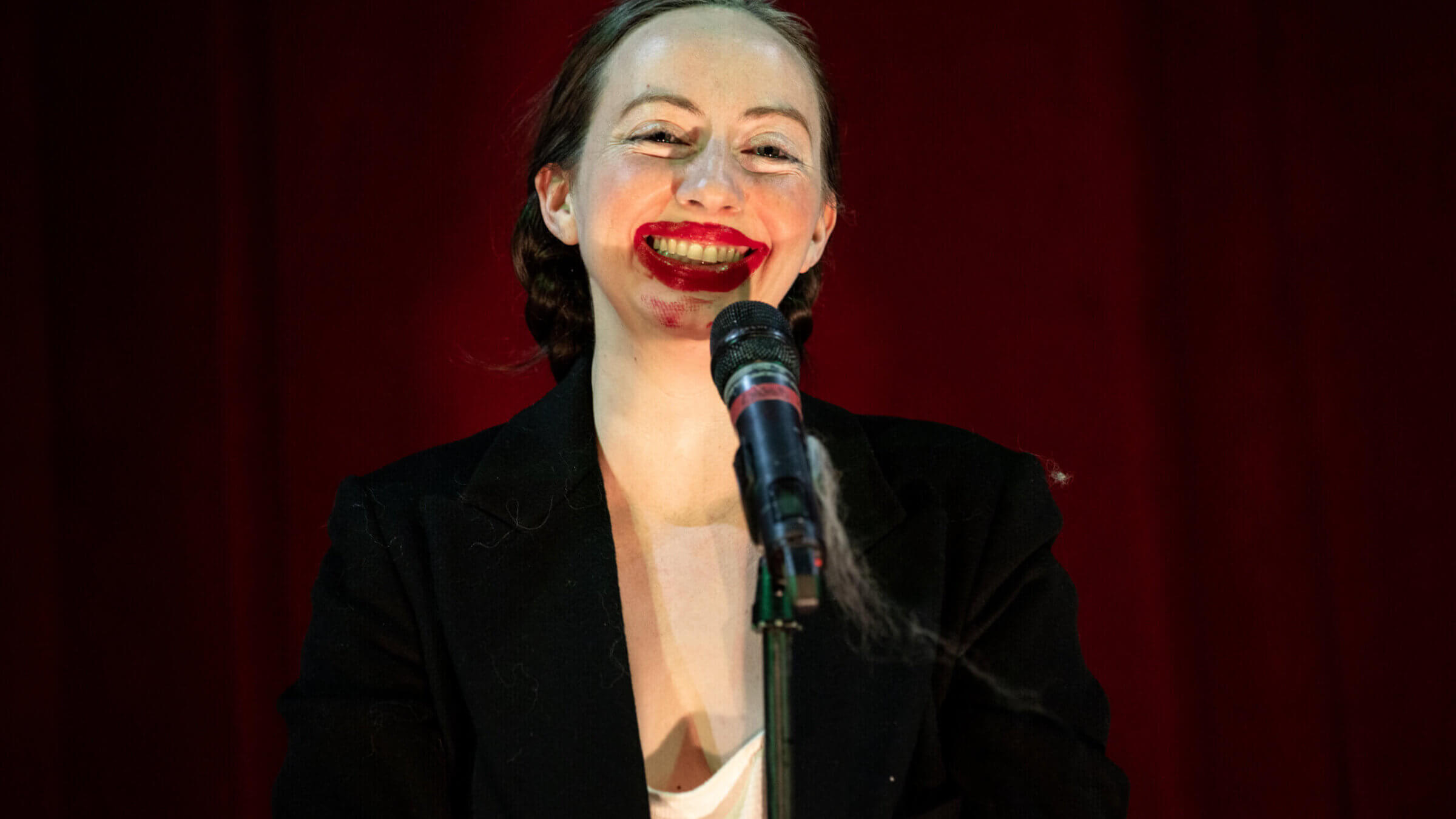
Alexandra Tatarsky’s “Sad Boys in Harpy Land” runs at Abrons Arts Center March 10–19. Photo by Maria Baranova
Alexandra Tatarsky was having a crisis in a luncheonette on Grand Street: There was no matzo brei.
Every time they come here (Tatarsky uses the pronouns she and they) they get the matzo brei, which is reliably awful. But it is a reliably awful necessity: There are certain rituals that anchor the world, and getting bad matzo brei at the tiny Lower East Side luncheonette that carries an aura of having fed the neighborhood since Tatarsky’s grandmother left her religious family there to become a “bohemian actor and dancer” is one of them.
But there was no matzo brei, and reality was crumpling. Tatarsky was wearing a worn-out black baseball cap with “WTF?” embroidered on the front. “I’m devastated,” she said. She ordered a grilled cheese with tomato, and a chocolate egg cream “for the table” — two straws.
Tatarsky, 33, is the theater artist behind the surreal new one-woman show Sad Boys in Harpy Land, now running at the Abrons Arts Center on the Lower East Side. It is impossible to describe exactly what the show is: Abrons describes it as “equal parts sad clown, demented cabaret, and extended crisis of meaning.”
It’s sort of about antisemitism, and it’s also sort of about Jewish self-hatred, and it’s also sort of about, Tatarsky said, “having fun making weird demons with toys and stuff.” It includes an extensive close read of the work of Johann Wolfgang von Goethe; an atonal but heartfelt song about the perils of tinned fish; an acrobatic tutorial in the work of being an artists’ model; a whole lot of Holocaust trauma; several rubber chickens; and one fake beard so long it must be wound and unwound via a fire-engine-red hand crank.
At a rehearsal a week before the show opened, Tatarsky was presented with that last item for the first time. They cradled it to their chest. “Look,” they said, tenderly, “the world’s longest wandering Jew beard.”
‘Hilarious, hilarious degree of self-torture’
Tatarsky grew up on the Lower East Side, just like that artistically inclined grandmother, whose family sat shiva for her after her rebellion. Their father “was raised in this neighborhood,” they said, “but not speaking to his grandparents, because they considered him to not exist, because his mother was dead to them.”
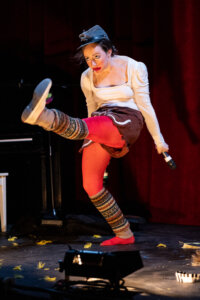
So Tatarsky was brought up “in this kind of milieu of arts and performance and Jews who had a lot of troubling feelings,” they said. “And from a young age, I was always making demented performances.”
The first of those performances: an opera, written at age 3, about then-New York Mayor David Dinkins. (The conflict, as Tatarsky remembers it: “We love you, but you’re not doing enough.”)
After graduating from Reed College — “I studied Russian Jewish experimental poetics and translation theory, so I was, like, thinking a lot about nonsense” — Tatarsky returned to the Lower East Side. The 2008 recession hit, and, as she tells it, the only economically viable way forward she could find was through performance. That work introduced her to an Irish clown called Ed Malone who one day informed her that she, too, was a clown. And from that point on, a clown, in fact, she was.
(In the theatrical world, clowning refers to performance that emphasizes playfulness, interaction with the audience and a guileless kind of social critique; clowns are more like court jesters than birthday party objects of joy and terror.)
As a clown, Tatarsky began to play onstage with ideas about nonsense that carried over from their student days, and also from their Mayor-Dinkins-isn’t-doing-enough days: “There was this political question about sitting around making clown shows, which often feels like doing nothing.”
Around the same time, she read Goethe’s Wilhelm Meister’s Apprenticeship, a novel about an upper-class young German man attempting and failing to commit himself to a life of art. She felt an odd closeness to Meister — like they were “trapped in the same story” about doing, well, nothing. It wasn’t comfortable, “because our identities are not the same, but they are very much entangled historically.”
Tatarsky was a Jew with troubling feelings about being Jewish. Maybe approaching those feelings through the lens of someone like Wilhelm Meister, a scion of the society that would eventually give rise to the Nazis, was a radical enough perspective shift to actually let her look at what the feelings meant. “If I am Wilhelm, I can say all these things,” she said. Challenging and disturbing things about the “hilarious, hilarious degree of self-torture” involved in trying to develop an individual identity and make art about it; about the “panic of nothingness” she felt every day; about being Jewish.
So Tatarsky decided they would make a lifelong project out of adapting Goethe’s novel, but never finish, just as Meister never, in the book, gets around to producing his own great work. Tatarsky would produce theirs — just in a series of highly un-literal performances that, getting deeper and deeper into the text, would never really end. They would make a performance that was both nothing and something. They call the project Seinfeld.
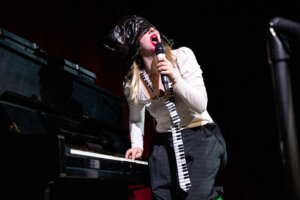
Sad Boys in Harpy Land is the third installment of Seinfeld. It was originally supposed to premiere in 2020, which, for obvious reasons, did not happen. (Tatarsky debuted the first installment in 2014.) It was going to focus on a single sentence from an unpublished novel about Wilhelm Meister that Goethe drafted and then discarded, in which Meister describes his mind as, Tatarsky said, “a theater of the inferno.” Then the pandemic happened, and it trapped Tatarsky even more in her own hellscape mind. But it also reintroduced her to an important sense of fun: She couldn’t perform, she couldn’t really leave her neighborhood, but she could go “play in the dirt.” That ethos — there’s something pretty dissonant, but also pretty human, about finding ways to have fun while tragedy is unfolding outside — informs Sad Boys in Harpy Land.
“My fear around the work is always that it seems like I’m making fun of something horrific, or that I’m treating very heavy topics with levity that is unwarranted,” Tatarsky said. “But what inspires me is that humor is a survival mechanism — a very Jewish survival mechanism.”
‘For me, this is about mystical Jewish philosophy’
Here is an incomplete list of the objects Tatarsky may or may not wear on their head in the course of performing Sad Boys in Harpy Land, which, in keeping with standard clown practice, is largely improvised: a tree branch pointing skyward, like a disproportionately large unicorn horn; the metal frame of a stool, adorned with a skirt made of potatoes; multiple wigs; a wire headdress outfitted with two styrofoam heads, also wearing wigs.
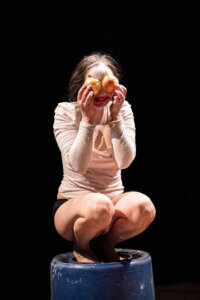
At a rehearsal I attended in, surprisingly, formalwear — I had a gala after — I kicked off my high heels to settle in on the floor, and Tatarsky promptly warned me to hide them, because they otherwise faced a strong likelihood of ending up in the show.
She began to warm up with her choreographic consultant, Lisa Fagan, and ran through her to-do list for the day. She wanted to work on “potato lady.” (See above, re, the stool.) She wanted to work on the three-headed beast at the gates of hell. And she wanted to do something with her “disordered tree thinking state.” (See above, re, the unicorn branch.)
She flexed her limbs. She told Lisa that she wanted the tree to look something like a Hebrew letter. “For me, this is about mystical Jewish philosophy of language,” she said. “God spoke the world into existence. There’s a supermaterial experience of language. I’m curious about what, like, a letter movement is.”
Tatarsky was concerned, they told me, about their decision to publicly bill Sad Boys in Harpy Land as being about “a Jewish woman who thinks she’s a German boy who thinks he’s a tree.” They worried it might put people off, not just because of the “um, what?” factor, but because of people like me, who see “Jewish” and “German” in the description of anything, and think, oh, God, I know what this is going to be like.
“How do you get out of that?” they said. “And therein lies the tragedy, and the comedy.”
‘Jewish hell can basically be understood as the feeling of shame’
If you are a Jew born after the Holocaust, you likely live with a certain set of conundrums about it. On the one hand, it can feel intimately connected to your history and identity. On the other, it didn’t exactly happen to you. So: How traumatized do you get to be? How much does it come to define you, and how much do you want to let it?
Sad Boys in Harpy Land is an extended effort to sit in the sense of funhouse-mirror horror that can come from thinking about these questions too much, for too long. It’s profoundly funny — it’s a clown show, after all — but it’s also, in a deeply personal way, desperate. There is a person onstage seeking any way out of having to think about these things, not because they don’t want to, but because the act of thinking about them feels like it swallows every last iota of their individuality. If they want to live, they have to be able to live as an individual. So they try to find a way out. And there is none.
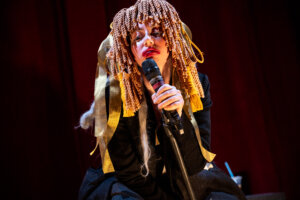
The result is a shockingly playful look at what it’s like to try and stay alive when it feels like history is crushing you. There’s a belligerent humor to it: Yes, she’s really saying all this! Can you believe it! But underneath that is a truth that contemporary art grappling with the legacy of the Holocaust can often fail to reach: It’s not just the facts of it that are enough to drive you insane. The inescapable knowledge that these facts are part of your identity, and you must think about them forever, can, too.
“I have been thinking about why I’m so drawn to hell, and hellscapes — such a Christian idea,” Tatarsky said. “It’s not like in any point in my Jewish education, I was really taught about hell. But apparently, Jewish hell can basically be understood as the feeling of shame. That’s the eternal punishment: a feeling of shame.”
‘I came here to talk to the demons’
At rehearsal, Tatarsky was working with Fagan, the choreographic consultant, on the beast at the gates of hell.
The show’s sound designer and composer, Shane Riley, cued up music to accompany her. Another member of the tech crew, set and costume designer Andreea Mincic, complained that there was oil on the floor. “When I was warming up I accidentally knocked over the anchovies,” Tatarsky said, apologetically. (Yes, the anchovies are a prop.)
Tatarsky arranged the wire and styrofoam head contraption around their neck, then began to snarl and writhe, laughing at themselves along the way. Eventually, they mimed giving birth to one of the heads. Acting like a beast at the gates of hell, they confessed, coming out of character, “is deeply humiliating. I can’t imagine anything stupider.”
It was a good start, Fagan said. But Tatarsky needed to take it further. The impression just wasn’t out-there enough. “I want to find my inner harpy,” Tatarsky said, “even though what comes much more naturally to me is my inner sad boy.”
They reset. They dropped to all fours, crawled to Fagan, and licked her knee. “Scratch me!” they demanded. They made out with one of the foam heads, while miming the other one gnawing on their shoulder. They howled: “I CAME HERE TO TALK TO THE DEMONS.”
Jewish hell might be shame. But just like there’s an odd kind of freedom in thinking about Jewishness from the perspective of a golden-haired German boy, there’s an odd kind of freedom in leaning into the shame, and seeing what you find there. “So much of our lives, we’re socialized to be kind of out of touch with our impulses,” Tatarsky said. “Maybe if you can see a person exploring that, it opens something up.”

















